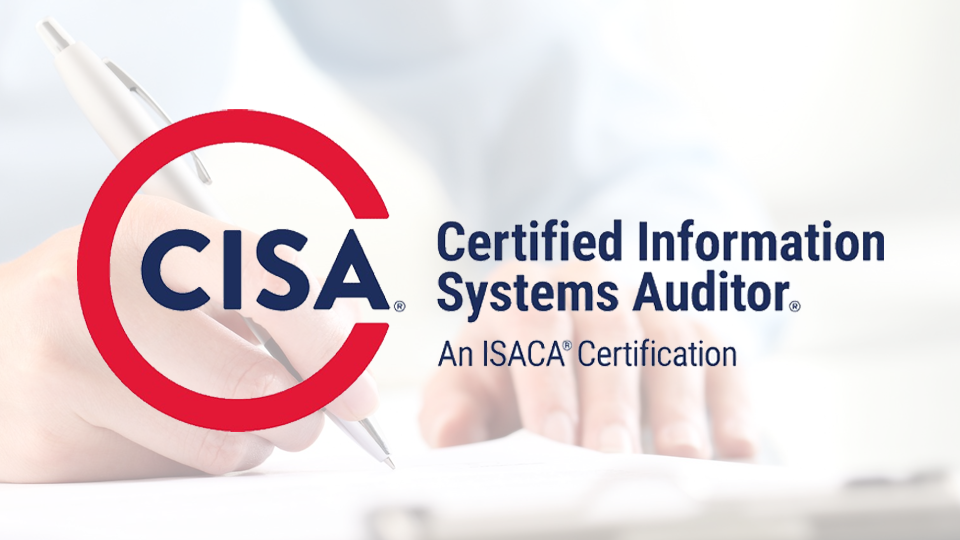
Could the lack of an internationally recognized cybersecurity certification put your organization at risk? With cyber threats growing daily, Saudi professionals urgently require training aligned with global standards. That is why the prestigious CISA designation is now critical. Offered by the global leader ISACA, this certification validates expertise across IT audit, information security, governance, and risk. Equipping your team with this knowledge will help protect your systems and data. Don’t leave your organization exposed. Provide your IT, cybersecurity and compliance staff the proven CISA program from the experts at ES Learning. Their accredited courses in Riyadh will prepare your professionals to pass the CISA exam – and secure your systems.
The Growing Need for CISA Certification in Saudi Arabia
High Demand for Cybersecurity Experts

There is a severe shortage of cybersecurity professionals in Saudi Arabia. According to research by (ESRC), over 70% of organizations struggle to fill cybersecurity roles. As digital transformation accelerates, the demand for information security expertise will only continue to grow. The CISA certification provides assurance that candidates have the necessary knowledge, skills, and abilities to fill critical cybersecurity roles.
Advancing Your Career

Earning the CISA certification can open up more career opportunities and higher pay for cybersecurity professionals in Saudi Arabia. According to recent surveys, CISA-certified professionals earn 20-50% higher salaries than their non-certified counterparts. The CISA is a globally recognized certification that demonstrates expertise in areas like IT governance, risk management, and cybersecurity. This can set CISA-certified professionals apart and make them strong candidates for leadership roles.
Meeting International Standards

Government entities and large organizations in Saudi Arabia increasingly require professional certifications like the CISA to ensure their cybersecurity teams meet international standards. By requiring the CISA, organizations can be confident their cybersecurity programs align with best practices and a common body of knowledge accepted worldwide.
The growing need for advanced cybersecurity skills, career opportunities, and alignment with international standards make the CISA an essential certification for cybersecurity professionals in Saudi Arabia. Government entities, ministries, and universities should provide CISA training and encourage their IT, cybersecurity, and GRC teams to earn this prestigious certification. ES Learning offers an accredited CISA certification course in Riyadh to help close the cybersecurity skills gap and empower security professionals in Saudi Arabia.
What Is the CISA Certification and Why Does It Matter?

The CISA certification is backed by ISACA, a nonprofit association focused on IT governance, risk management, and cybersecurity. The CISA credential demonstrates an individual’s competence and skill in auditing, controlling, and evaluating an enterprise’s information technology and business systems.
To earn the CISA certification, candidates must pass an exam covering five job practice areas: Information System Auditing Process, Governance and Management of IT, Information Systems Acquisition, Development and Implementation, Information Systems Operations and Maintenance, and Protection of Information Assets. Professionals with a CISA certification have proven knowledge and experience in these areas, making them valuable to any organization.
Why is CISA Important for Organizations?

CISA-certified professionals help ensure that an organization’s information systems and infrastructure are protected, controlled, and leveraged to support enterprise goals. Their skills allow them to evaluate vulnerabilities, report on compliance and risk management, and recommend solutions to reduce risk. Organizations that employ CISA-certified staff benefit from their expertise in developing, managing, and overseeing information systems controls.
Why Should Professionals Pursue the CISA Certification?

For professionals, the CISA certification provides credibility and recognition of their knowledge and experience. It opens up more career opportunities and higher salary potential. A recent study found that CISA certification holders earn over 20% more than their non-certified peers.The certification is globally recognized, enabling mobility across organizations and borders. Professionals certified as CISA are equipped to take on leadership roles in IT audit, control, and security.
In today’s digital world, the CISA certification is increasingly important for organizations and professionals alike. It signifies competence and expertise that translates to a more secure and well-governed information infrastructure. For Saudi organizations, employing CISA-certified professionals is critical to ensuring cyber resilience and to safeguarding sensitive data and operations. Offering the CISA course to IT, cybersecurity and governance staff would demonstrate a commitment to professional excellence and to national cybersecurity.
Key Knowledge Domains Covered in the CISA Exam
Information Systems Auditing Process
The CISA exam extensively tests candidates’ knowledge of information systems auditing processes and procedures. This includes understanding how to plan and conduct an audit, as well as how to report on audit findings. Planning an audit involves determining the audit objective and scope, assessing risks, and allocating resources. Conducting an audit requires collecting and analyzing evidence to determine if controls are adequately designed and operating effectively. Reporting on audit findings should be done objectively, clearly stating the implications and recommending corrective actions. In-depth knowledge of information systems auditing standards, processes, and techniques is essential for CISA candidates.
Governance and Management of IT
The CISA exam also evaluates candidates’ understanding of IT governance and management frameworks and processes. This includes knowledge of how to evaluate organizational structures and processes to determine if they enable the organization to achieve its goals and objectives. Key areas include strategic planning, project management, risk management, resource management, and performance measurement. CISA candidates must understand the importance of implementing and continuously monitoring control objectives for information and related technologies, as well as mechanisms to report deficiencies to appropriate parties.
Information Systems Acquisition, Development, and Implementation

Another domain tests knowledge of the systems acquisition, development, and implementation lifecycle. CISA candidates must understand methodologies and processes for acquiring, developing, testing, and implementing information systems to meet the organization’s objectives. This includes evaluating requests for proposals, contracts, and system development methodologies to ensure requirements are met. Candidates must also understand change and configuration management to maintain system integrity during system upgrades and modifications. Knowledge of system acceptance testing, data conversion planning, and user training are also imperative.
In summary, the CISA certification covers a broad range of topics focused on information systems auditing, control and security. Achieving CISA certification demonstrates in-depth knowledge and experience in these critical areas. For Saudi organizations, having CISA-certified professionals can help strengthen information systems governance and cybersecurity defenses.
Why Saudi Organizations Need CISA-Certified Professionals
Validates Critical Knowledge and Experience
The CISA certification demonstrates an individual’s knowledge and experience in the field of IS auditing, control, and security. For Saudi organizations, hiring CISA-certified professionals validates that candidates have the necessary skills and competencies to audit and control information systems. These professionals can hit the ground running, conducting timely audits of the organization’s information system architecture and ensuring regulatory compliance from the start.
Provides a Methodical, Disciplined Approach
CISA training equips professionals with a structured methodology for auditing information systems and managing risk. Certified individuals have a deep understanding of how to assess vulnerabilities, identify compliance issues, and mitigate risk in a systematic manner. They are adept at developing audit programs, evaluating controls, and reporting on the effectiveness and efficiency of information systems. This methodical approach is invaluable for Saudi government entities and organizations dealing with sensitive data and operations.
Increases Value to Organizations
CISA certification increases an individual’s value to organizations through demonstrated knowledge and experience. Certified professionals are highly sought after, and studies show they command higher salaries. For Saudi organizations, hiring CISA-certified employees also demonstrates a commitment to data security, privacy, and compliance. This can build trust in the organization and confidence that sensitive systems and information are being properly managed and secured.
In summary, CISA certification produces professionals with the knowledge, skills, experience and disciplined approach Saudi organizations need to strengthen their information systems and cybersecurity. Investing in CISA training for key employees will equip Saudi government entities and private organizations with valuable human resources to achieve a robust IS audit and control framework.
Benefits of Earning the CISA Credential
The Certified Information Systems Auditor (CISA) certification is considered the gold standard for professionals in information systems auditing, control, and security. Earning this credential demonstrates an individual’s proficiency and competence in ensuring that an organization’s information systems are protected and controlled.
High Salary Expectations
According to multiple industry surveys, CISA is one of the highest-paying certifications in the information technology field. CISA holders can command an average salary of over $130,000 per year in the United States. In Saudi Arabia, CISA certified professionals earn 20-30% higher salaries than their non-certified counterparts. The CISA credential signifies a skill set that is in high demand, so individuals with this certification are well positioned to secure leadership roles and earn strong compensation.
Global Recognition of Competence
The CISA certification is recognized internationally as the benchmark for professionals in information systems auditing and control. Earning CISA demonstrates an individual’s proficiency and competence in these areas according to a globally accepted standard. CISA holders are equipped with knowledge and skills that allow them to thrive in today’s digital economy regardless of geographic location or industry. They have a strong grasp of how to govern and secure information systems and think strategically about mitigating risks in the cyber landscape.
Develops Technical Resilience
The CISA exam covers a comprehensive range of topics related to information systems auditing, control, and security. To earn CISA, candidates must demonstrate knowledge across all subject areas outlined in the CISA job practice areas. This helps build a mindset focused on vigilance, risk awareness, and technical resilience. CISA holders learn how to anticipate and safeguard against threats, protect information assets, and ensure operational stability. These skills have become increasingly crucial as cyber risks intensify and organizations face more frequent and sophisticated attacks.
In summary, the CISA certification provides significant benefits both for individuals seeking to advance their careers as well as for organizations aiming to develop technical resilience. For these reasons, government entities, ministries and universities in Saudi Arabia should strongly consider providing CISA courses and sponsoring employees to earn this prestigious credential.
CISA Certification Requirements and Exam Details
To obtain the Certified Information Systems Auditor (CISA) certification, candidates must meet certain requirements and pass a comprehensive exam.
Certification Requirements
To qualify for the CISA exam, applicants must have a minimum of five years of professional experience in information systems auditing, control, or security. A bachelor’s degree from an accredited university or college can substitute for up to two years of experience. Applicants must also agree to abide by ISACA’s Code of Professional Ethics.
The CISA Exam
The CISA exam lasts four hours and consists of 150 multiple-choice questions. The exam tests candidates’ knowledge across five domains: Information Systems Auditing Process, Governance and Management of IT, Information Systems Acquisition, Development and Implementation, Information Systems Operations and Maintenance, and Protection of Information Assets. Candidates must score above the passing score, which is re-calculated for each exam window based on the average scores of all candidates.
To maintain the CISA certification, CISAs must complete a minimum of 20 hours of continuing professional education each year and pay an annual maintenance fee. The CISA certification is valid for three years. CISAs must re-certify every three years by retaking and passing the CISA exam or by earning the required CPE credits.
The CISA certification provides numerous benefits for information systems professionals. Achieving the CISA certification demonstrates competence and credibility as an information systems auditor to employers and clients. The CISA is a globally recognized certification that can lead to career advancement and higher pay. CISA certification also strengthens information security practices and ensures that critical infrastructures are protected.
For organizations in Saudi Arabia, the CISA certification can help address the shortage of qualified information systems auditors and strengthen cybersecurity defenses. By supporting CISA certification for employees, government entities, ministries and universities in Saudi Arabia can build internal information systems auditing capacity and protect sensitive data and critical infrastructure.
CISA Certification Cost and Fees in Saudi Arabia
The Certified Information Systems Auditor (CISA) certification is an internationally recognized certification for professionals in the fields of IT audit, control, and information security. To obtain the CISA certification, candidates must pass an exam and meet certain work experience requirements. In Saudi Arabia, the CISA exam fee for ISACA members is USD 575, while non-members pay USD 760 to take the exam. CISA training courses in Saudi Arabia typically start around SAR 10,895.
Exam Fee
The CISA exam fee in Saudi Arabia is USD 575 for ISACA members and USD 760 for non-members. The exam fee includes one exam attempt and a one-year membership in ISACA. Additional exam attempts are USD 460 for members and USD 645 for non-members. ISACA membership provides access to useful resources to help in preparing for the CISA exam. Government entities and universities in Saudi Arabia interested in providing high-quality cybersecurity training to their IT and GRC staff should consider covering the exam fees and ISACA membership dues.
Return on Investment
While the CISA exam and training does require a financial investment, the benefits to organizations and professionals far outweigh the costs. CISA certified professionals have a demonstrated knowledge of key cybersecurity and IT audit topics that allows them to better protect their organizations. The CISA credential is globally recognized, providing certified individuals with greater career opportunities and earning potential. For government entities and universities, having CISA certified staff enhances security and compliance, reducing risks and the potential impacts of a cyberattack.
In summary, while the CISA exam and training fees may seem substantial, the long term benefits to organizations, professionals, and society overall make the CISA certification extremely valuable for Saudi Arabia. Government organizations and universities should consider covering CISA costs as an investment in the strength and security of their IT systems and staff.
How to Prepare for the CISA Exam
Preparing for the Certified Information Systems Auditor (CISA) exam entails significant dedication and time. Candidates should allow several months to study the CISA Review Manual and other ISACA materials to build knowledge and understanding of the job practice areas and pass the exam.
The CISA exam tests candidates on their expertise and competence in the governance and management of enterprise IT and the auditing of information systems. To achieve a passing score, individuals must devote substantial hours comprehending the concepts and topics in the CISA Review Manual and solving the sample questions and mock exams. Setting a regular study schedule and adhering to it is essential.
Candidates should start by scrutinizing the CISA exam syllabus to gain familiarity with the scope and focus of each job practice area. They must then meticulously examine all ISACA CISA Review Manual contents related to the domains, including the explanations, examples, practice questions, and key terms. Rereading difficult parts and taking notes and highlighting core information will help with learning and retention.
After comprehending the CISA Review Manual, candidates should solve the sample questions and mock exams in the CISA Review Questions, Answers & Explanations Manual and CISA Review Questions, Answers & Explanations Database. These provide an opportunity to apply knowledge in a simulated exam environment. Reviewing the answers and explanations for any incorrect responses helps to identify knowledge gaps and areas needing further study.
In the final weeks of preparation, candidates should participate in CISA exam preparation training and continue practicing with mock exams. They must also revise and reinforce their understanding of job practice areas they find most challenging. Diligent exam preparation and persistence will maximize the likelihood of success. By dedicating the necessary time to gain expertise in the CISA exam content, candidates can achieve their goal of becoming Certified Information Systems Auditors.
CISA Domain FAQs: Answering Your Top Questions
The Certified Information Systems Auditor (CISA) certification covers a wide range of topics across five domains. For professionals pursuing CISA certification, questions frequently arise regarding the exam content and how best to prepare. This section addresses some of the most common questions about CISA Domain 4, Information Systems Operations, Maintenance and Support, and Domain 5, Protection of Information Assets.
Domain 4 focuses on key concepts of information systems, including system development, acquisition, implementation, and maintenance. Candidates must understand system testing methodologies, change control procedures, and software licensing issues. Frequently asked questions include how in-depth one must know various system development life cycle models and specific testing techniques. While a broad understanding is required, candidates do not need to memorize every detail of every model and technique.
Domain 5 requires mastering key concepts and study hacks related to protecting information assets. This includes understanding and applying confidentiality, integrity, and availability principles. Common questions concern the amount of detail needed regarding various access control models, authentication methods, and encryption algorithms. Again, a general understanding of these topics is sufficient; candidates do not need an in-depth knowledge of every model, method, and algorithm.
The CISA exam tests one’s knowledge and ability to apply concepts and best practices. While the exam covers a wide range of content, candidates do not need to be experts in every topic. Studying the CISA Review Manual and taking a CISA preparation course can help build the necessary understanding and confidence to pass the exam. With diligent preparation, information systems audit and cybersecurity professionals in Saudi Arabia can achieve CISA certification and demonstrate their competence to employers.
In summary, Domains 4 and 5 cover essential concepts related to information systems and security that CISA candidates must understand. However, they do not require memorizing every detail, just broad knowledge and the ability to apply principles. With the right preparation, CISA certification is achievable for professionals in Saudi Arabia seeking to advance their careers.
Conclusion
Despite the rapid digitization of the Kingdom, cyber threats continue to evolve, exploiting new vulnerabilities daily. As critical infrastructure moves online, the need for qualified information security professionals becomes increasingly urgent. Earning the globally recognized CISA certification must be a priority for current IT auditors and cybersecurity professionals. Doing so will provide Saudi organizations with the skilled workforce required to protect sensitive data and critical systems from disruption. With reputable training centers like ES Learning offering CISA exam preparation, decision-makers can invest in their employees’ development and Saudi Arabia’s cyber resilience. The time to act is now – register today and secure the Kingdom’s digital future.


